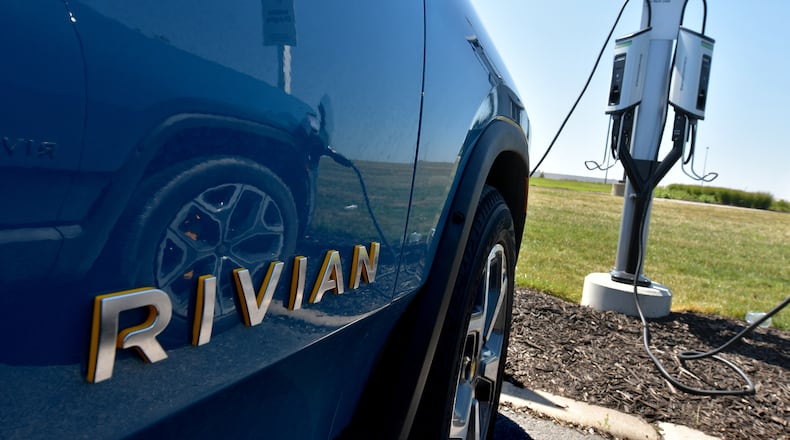Electric vehicle startup Rivian, which plans to build a $5 billion factory in Georgia, continues to increase its quarterly revenues but has been unable to temper its losses as it ramps up vehicle production.
Rivian said it expects to double its vehicle output this year at its current factory in Normal, Illinois. Though the company expects to remain in the red in 2023, Rivian told shareholders it will narrow its losses as it better manages supply chain and production issues that have hurt its performance.
Rivian reported a $1.8 billion fourth quarter loss, a 28% smaller loss compared to the same quarter in 2021. For the full year, Rivian reported a $6.8 billion loss, up about 44% from $4.7 billion in 2021.
Rivian said it ended 2022 with $12.1 billion in cash reserves, but that number is down from $18.4 billion at the beginning of last year. Rivian drew criticism from analysts by refusing to disclose the number of preordered Rivian vehicles on backlog. Rivian had said Nov. 7 that it had 114,000 vehicles on order in addition to 100,000 vans it is providing Amazon.
Credit: RON JOHNSON
Credit: RON JOHNSON
Rivian, based in California, was founded about a dozen years ago. But it only started building its R1T pickup, R1S SUV and Amazon delivery trucks in 2021. The company is expected to burn through billions as it refines its manufacturing and scales production. But it faces fierce competition from the likes of Tesla and traditional automakers as they electrify their fleets.
Rivian reported $663 million in revenue during the quarter that ended in December, a 24% increase from the prior quarter and a tenfold increase over the fourth quarter of 2021. Rivian reported $1.7 billion in revenues during the past year.
Rivian cut their initial 2022 production goals in half to 25,000, citing supply chain issues. The company fell just short of its revised goal, but Rivian did increase assembly each quarter with a high of 10,020 vehicles in the final three months of the year.
Rivian announced Tuesday its 2023 production target is 50,000 vehicles. Chief Financial Officer Claire McDonough said on a call with investors that vehicle production lines have been halted for much of 2023 so far to incorporate new technologies. But the technology improvements will improve production, vehicle range “and deliver cost reductions that are critically important to our path to profitability,” she said.
In December 2021, Rivian committed to building a sprawling EV plant on 2,000 acres in southern Morgan and Walton counties, roughly an hour east of Atlanta. The factory is expected to employ 7,500 workers and begin producing vehicles in 2025. Cox Enterprises, owner of The Atlanta Journal-Constitution, owns about a 4% stake in Rivian and holds a board seat.
Rivian said it expects capital expenditures in 2023 to increase to $2 billion, partially driven by increased costs in Georgia.
In a letter to shareholders, Rivian officials said they expect to more efficiently ramp up production of a new vehicle, the R2 crossover, in Georgia, starting in 2026. The R2 is designed as a mass-market crossover that will be sold at a lower price.
Rivian officials prepared shareholders for continuing supply chain issues, which the company expects to persist this year. There were multiple days of “lost production” last year due to supplier shortages, and Rivian CEO RJ Scaringe said they’re currently renegotiating supplier contracts, which he expects to lower production costs.
He said it will be crucial for the R2′s price point to qualify for tax credits under the Inflation Reduction Act. SUVs must be priced at less than $80,000 to qualify for a $7,500 EV tax credit.
“It’s really important that the way we manufacture the vehicle ensures IRA compliance,” Scaringe said. “The price points will be considerably lower (than existing Rivian models) and will fall really right into the sweet spot.”
Despite production in Georgia being years away, the company is already facing challenges in the Peach State.
Local residents who oppose the factory have filed multiple lawsuits attempting to derail the project. A local judge sided with opponents in a ruling that scuttled some $700 million in property tax breaks.
The state appealed that ruling, and an appeals court panel recently heard arguments in the case. Rivian would be able to pull out of the deal May 1 if certain provisions of their agreement with the state and a local development authority are not met, including the validation of bonds central to that property tax break. The company previously declined to comment on pending litigation.
About the Author
Keep Reading
The Latest
Featured





